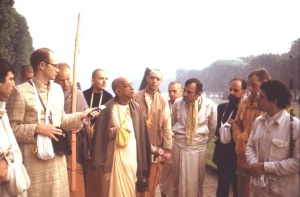CC Adi 17.308 (1975): Difference between revisions
(Vanibot #0027: CCMirror - Mirror CC's 1996 edition to form a basis for 1975) |
(Vanibot #0020: VersionCompareLinker - added a link to the Version Compare feature) |
||
| Line 2: | Line 2: | ||
<div style="float:left">'''[[Sri Caitanya-caritamrta (1975)|Śrī Caitanya-caritāmṛta (1975)]] - [[CC Adi (1975)|Ādi-līlā]] - [[CC Adi 17 (1975)|Chapter 17: The Pastimes of Lord Caitanya Mahāprabhu in His Youth]]'''</div> | <div style="float:left">'''[[Sri Caitanya-caritamrta (1975)|Śrī Caitanya-caritāmṛta (1975)]] - [[CC Adi (1975)|Ādi-līlā]] - [[CC Adi 17 (1975)|Chapter 17: The Pastimes of Lord Caitanya Mahāprabhu in His Youth]]'''</div> | ||
<div style="float:right">[[File:Go-previous.png|link=CC Adi 17.307 (1975)|Ādi-līlā 17.307]] '''[[CC Adi 17.307 (1975)|Ādi-līlā 17.307]] - [[CC Adi 17.309 (1975)|Ādi-līlā 17.309]]''' [[File:Go-next.png|link=CC Adi 17.309 (1975)|Ādi-līlā 17.309]]</div> | <div style="float:right">[[File:Go-previous.png|link=CC Adi 17.307 (1975)|Ādi-līlā 17.307]] '''[[CC Adi 17.307 (1975)|Ādi-līlā 17.307]] - [[CC Adi 17.309 (1975)|Ādi-līlā 17.309]]''' [[File:Go-next.png|link=CC Adi 17.309 (1975)|Ādi-līlā 17.309]]</div> | ||
{{CompareVersions|CC|Adi 17.308|CC 1975|CC 1996}} | |||
{{RandomImage}} | {{RandomImage}} | ||
==== TEXT 308 ==== | ==== TEXT 308 ==== | ||
| Line 20: | Line 19: | ||
<div class="synonyms"> | <div class="synonyms"> | ||
acintyāḥ—inconceivable; khalu—certainly; ye—those; | acintyāḥ—inconceivable; khalu—certainly; ye—those; bhāvaḥ—subject matters; na—not; tān—them; tarkeṇa—by argument; yojayet—one may understand; prakṛtibhyaḥ—to material nature; param—transcendental; yat—that which; ca—and; tat—that; acintyasya—of the inconceivable; lakṣaṇam—a symptom. | ||
</div> | </div> | ||
| Line 27: | Line 26: | ||
<div class="translation"> | <div class="translation"> | ||
"Anything transcendental to material nature is called inconceivable, whereas arguments are all mundane. Since mundane arguments cannot touch transcendental subject matters, one should not try to understand transcendental subjects through mundane arguments." | |||
</div> | </div> | ||
| Line 34: | Line 33: | ||
<div class="purport"> | <div class="purport"> | ||
This | This is a quote from the Bhakti-rasāmṛta-sindhu (2.5.93) by Śrīla Rūpa Gosvāmī. | ||
</div> | </div> | ||
Latest revision as of 16:33, 26 January 2020
Śrī Caitanya-caritāmṛta (1975) - Ādi-līlā - Chapter 17: The Pastimes of Lord Caitanya Mahāprabhu in His Youth

His Divine Grace
A.C. Bhaktivedanta Swami Prabhupada
A.C. Bhaktivedanta Swami Prabhupada
TEXT 308
- acintyāḥ khalu ye bhāvā
- na tāṁs tarkeṇa yojayet
- prakṛtibhyaḥ paraṁ yac ca
- tad acintyasya lakṣaṇam
SYNONYMS
acintyāḥ—inconceivable; khalu—certainly; ye—those; bhāvaḥ—subject matters; na—not; tān—them; tarkeṇa—by argument; yojayet—one may understand; prakṛtibhyaḥ—to material nature; param—transcendental; yat—that which; ca—and; tat—that; acintyasya—of the inconceivable; lakṣaṇam—a symptom.
TRANSLATION
"Anything transcendental to material nature is called inconceivable, whereas arguments are all mundane. Since mundane arguments cannot touch transcendental subject matters, one should not try to understand transcendental subjects through mundane arguments."
PURPORT
This is a quote from the Bhakti-rasāmṛta-sindhu (2.5.93) by Śrīla Rūpa Gosvāmī.